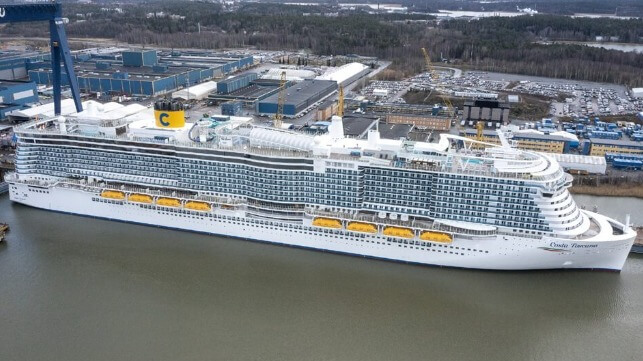Costa is Latest Cruise Line Planning to Adopt Methanol Fuel

Carnival Corporation’s Costa Group, which manages Costa Cruises and AIDA, is taking steps to support the implementation of methanol as a marine fuel for the cruise industry. Costa will be working with methanol producer Proman to drive methanol supply and development for the cruise industry. Costa joins with others including Germany’s TUI Cruises, Disney, and Norwegian Cruise Line Holdings, which have also declared their interest in moving toward methanol as a fuel for their cruise ships.
Through the partnership, Costa and Proman aim to accelerate the energy transition and decarbonization of the existing cruise ship fleet by enhancing the supply of sustainable methanol. They are looking to pave the way for the retrofitting of existing vessels to operate on the alternate fuel, as well as investment in further methanol-fueled new builds.
As one of the most widely traded chemical commodities, the companies are highlighting that the infrastructure for ship supply of methanol could be adapted from existing infrastructure. All forms of methanol, whether natural-gas based, low-carbon, or renewable, they said can be blended regardless of production pathways. The existing technology and infrastructure, Costa and Proman believe will enable a reliable transition pathway from today to fully GHG neutral cruise ships in near future.
“The technology to retrofit a vessel to accept methanol as a fuel is available today,” highlights Tim Cornelius, Proman’s Managing Director of Corporate Development. “Methanol-powered vessels have a proven track record of reducing and eliminating major greenhouse gas emissions, delivering immediate air quality improvements around major ports and shipping lanes. We are excited to bring our expertise along the full methanol value chain to help deliver on Costa Group’s bold ambitions.”
Both Costa and AIDA operate dual-fuel vessels that were built for full-time use of LNG as their primary fuels. AIDA introduced the first LNG-fueled cruise ships, first building ships in Japan in the mid-2010s that used LNG supplied by tanker trucks while the vessels are on dock. In 2018, the AIDANova became the first cruise ship capable of sailing full-time on LNG and the 180,000 gross ton ship was the prototype for Carnival’s LNG ships. AIDA added a second LNG-fueled ship, both built at Meyer Werft in Germany, while Costa built two similar vessels at Meyer Turku in Finland. Carnival Corporation by the end of 2023, will have nine ships that are capable of full-time LNG operations plus the two AIDA ships that can be powered by LNG while on dock.
Both cruise lines have been pursuing a variety of programs as pioneers in reducing emissions in the cruise segment. AIDA recently became the first to do large-scale tests with biofuel and is also exploring batteries and other power systems as well as the broad use of shore power when available in port.
“We are reducing the carbon footprint of our fleet while at port and at sea, investing in advanced environmental technologies and partnering with companies such as Proman who share a passion for sustainable energy transition,” said Dr. Christoph Schladoer, VP Decarbonisation Costa Group. “By enabling cruise ships to use methanol as a propulsion fuel, Costa follows the ambition to take the next big step towards GHG neutral operations of our fleet by 2050.”
Last year, Germany’s TUI Cruises began construction of the first large cruise ship designed to be methanol-ready. The 111,500 gross ton cruise ship, which is due to enter service in 2024, is being built at Meyer Turku. The cruise company is also building two LNG-fueled cruise ships at Fincantieri in Italy.
Other cruise lines are also moving forward with efforts to adopt methanol for their fleets. Norwegian Cruise Line Holdings decided to bypass LNG and focus its efforts on methanol, including a Memorandum of Understanding agreement with MAN that provides for a multi-stage project studying the feasibility of methanol operations for cruise ships. As part of the project, MAN Energy Solutions will retrofit a medium-speed MAN 48/60 engine to make it capable of dual-fuel diesel/methanol operation.
Disney Cruise Line also announced that it expects the Global Dream cruise ship that it acquired from bankrupt MV Werften will be converted to operate on methanol. Due to enter service in 2025, Disney has said that it expects the 208,000 gross ton cruise ship will be among the first in the industry to be fueled by green methanol.
No comments:
Post a Comment